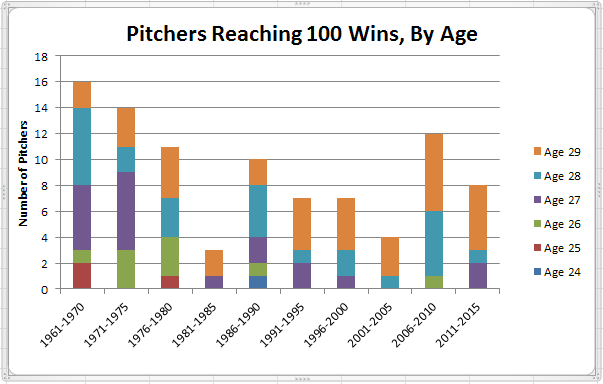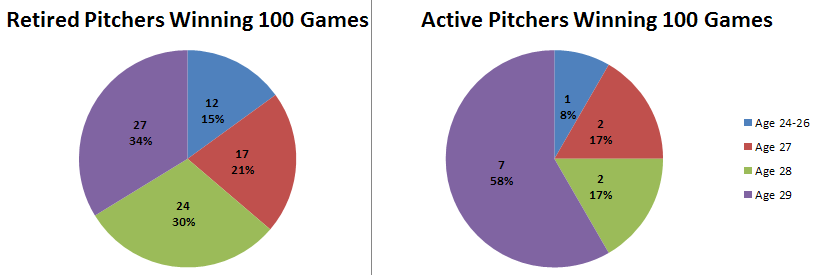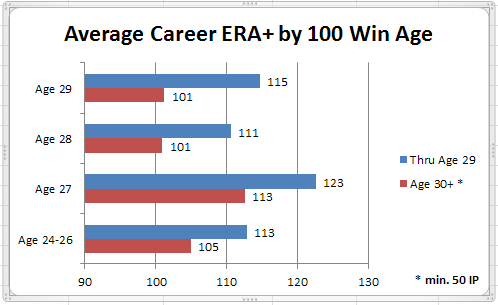On September 5th, David Price notched the 100th win of his career against Baltimore. Nine days earlier, Yovanni Gallardo had done the same against Toronto (one of the few pitchers to beat the Blue Jays last month). Those two followed Clayton Kershaw, who collected his century win against Colorado on May 15th. What else do these three have in common? All have yet to embark on their age 30 season, making them the latest of just 92 pitchers to win 100 games since 1961 and do so before their age 30 season. More after the jump.
You might be wondering about the adjective “just” in describing 92 pitchers with 100 wins. In fact, those pitchers able to do this before age 30 are in the distinct minority, comprising less than one third of the 295 pitchers with 100 wins since 1961 (Ubaldo Jiminez, R.A. Dickey, Scott Kazmir, Matt Cain and Wandy Rodriguez, all of whom are aged 30+, each have at least 97 wins so that total should reach the 300 mark either late this season or, more likely, early next year).
Here are the notable 92 in tabular form, arranged by their age in the year in which they notched win no. 100. You can display specific players or years by typing in the search box.
[table id=254 /]
.
To clarify the selection criteria, only those pitchers with 100 wins since 1961, all of them before their age 30 season, are included. However, pitchers meeting that criteria are shown in the table in the year in which they collected the 100th win of their careers, NOT necessarily their 100th win since 1961. Hopefully, that’s clear.
Here is how those 92 pitchers are distributed over the past 55 years.
While there are 25% more MLB teams now than in the early 1970s, the number of pitchers reaching 100 wins by age 29 has generally declined over that period while the age at which the 100th win is attained has increased. The latter result is evident in the charts below showing the distribution by 100 win age among the 80 retired pitchers and 12 active hurlers in our group of 92.
Intuitively, one would expect career totals to increase based on career length prior to each player’s decline phase. Bill James in his 1980s Abstracts demonstrated this fact by looking at two groups of players with similar rookie seasons. The first group were rookies at age 21 and the second group at age 22. But, aside from that difference, all of the seasons were very similar. What James discovered, to his surprise, was that the age 21 group would go on to compile, on average, 50% more career value than the age 22 group. So, one year can indeed make quite a difference.
With that preamble, I was curious whether a similar career value effect might be seen based on the age at which pitchers reach 100 wins. I would hesitate to infer too much from our group of 80 expansion era retired pitchers reaching 100 wins by age 29 but, in fact, a similar effect is quite evident, as shown below.
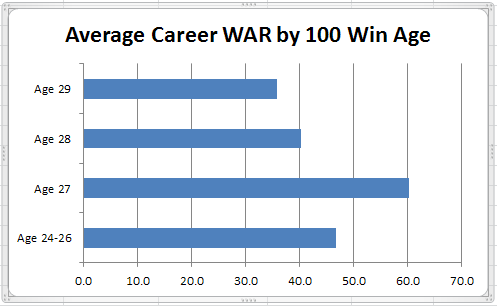
The 17 pitchers reaching 100 wins at age 27 averaged 60 WAR for their careers, 50% more than the 40 WAR average for the 24 pitchers who notched win no. 100 at age 28. And, when we look at who those pitchers are, it’s not hard to understand that result. Going back to our table, here are those two groups, with active pitchers also included.
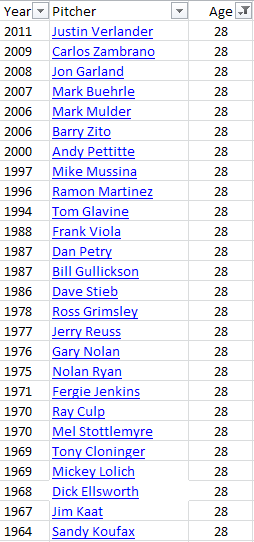
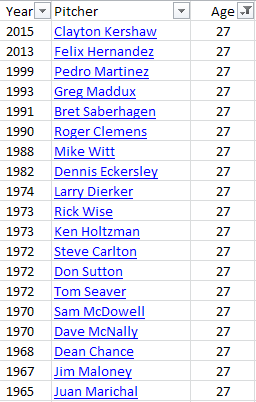
So, the age 27 group contains a number of all-time greats, while the age 28 group has a few of those but many more who were just good to great.
But, are we seeing cause or effect? Does the age 27 group have 50% more WAR because, by some fluke, the pitchers in the group are better, or are the pitchers in the group better because they wouldn’t be in the group otherwise (i.e. only the best will reach that performance level that soon)?
One way to look at that question is to compare the active pitchers in the two groups, which gives us Kershaw and Hernandez (age 27) versus Verlander and Buehrle (age 28). The comparison is a bit unfair because we know a lot more about the careers of the age 28 guys but I think most everyone has an instinctive sense that Kershaw and Hernandez are just at a different level than the other two.
But if age 27 guys are great, wouldn’t the even younger ones be better still? You might think so, but recent evidence would indicate otherwise. Here’s the list.
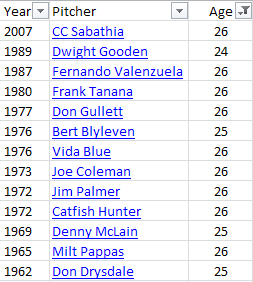
Of the group above, only Palmer and Blyleven were able to compile a full career at a consistently high performance level. Too heavy a workload too soon just doesn’t seem to work well for long-term success, as indicated by the chart below.
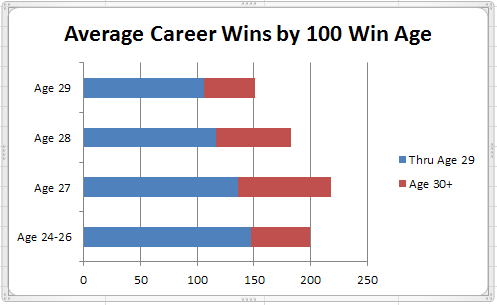
Not surprisingly the age 24-26 group had the most wins through age 29, but the smallest proportion of wins for age 30+, mainly due to lower age 30+ innings totals than the age 27 and 28 groups, as shown below.
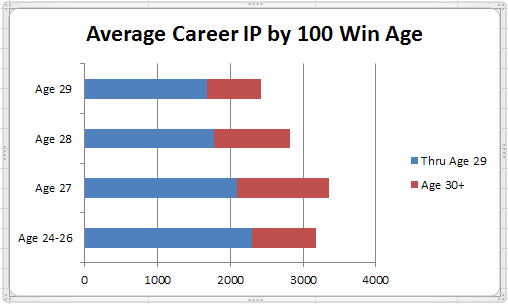
The age 29 group has a particularly sharp drop-off in age 30+ workload, averaging barely four full seasons with league average ERA+ as shown below. Food for thought, perhaps, for the teams that will be competing for services of David Price (who turned 30 on Aug 26th) this off-season.

